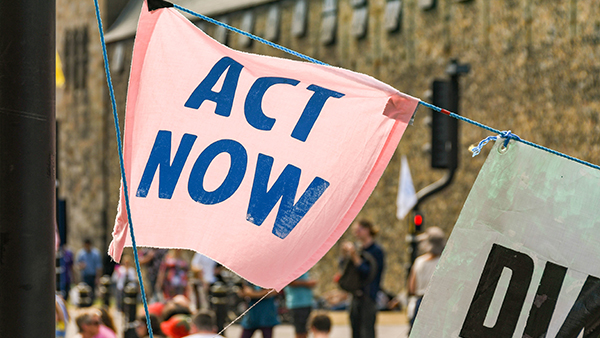Watching Brexit is like watching a Jenga tower being constructed in slow motion.
Everything looks stable, slowly building - the wobbles and structural weaknesses remain hidden. And just as we seem to be getting towards something solid, the whole thing is knocked down and we start once more.
(Or, to use another analogy: UK democracy seems condemned to roll the boulder of Brexit up a hill for eternity - like Sisyphus but in Brussels, not Hades.)
Why has Brexit caused us to get stuck like this? Because it’s a problem that requires a consensus approach, and British democracy is built on majorities. Until we can address that mis-match, we won’t be able to find a lasting way forward.
Types of democracy and Britain
The idea of different types of democratic cultures goes back to the work of Arend Lijphart and his two types of democracies: majoritarian and consensus.
In this system, Britain was the leading example of a ‘majoritarian democracy’ - a country with an electoral system which creates artificial majorities for governing parties in normal circumstances.
We’re used to two main parties in the House of Commons, divided by economics/class, with one having a clear majority. But times are changing. Powerful divisions have opened up between and within the big parties on both:
- economics since the 2008 financial crash and the austerity that followed
- culture and identity politics in the context of Brexit.
Brexit would be a huge change, so this isn’t surprising. Also, deep divisions were hidden for some time. Perhaps the majority that the 2005 Labour Government acquired for just over a third of the vote was a warning shot. Fragmentation was coming.
Which brings us to Lijphart’s other type: ‘consensus democracy’. These are democratic systems where a large number of parties regularly work together in coalitions, looking for common ground between different groups. They are more common in divided countries, as a way to manage differences in society.
Lijphart himself is Dutch and it is no coincidence that he could see from his own country how a consensus system could produce consistent economic policy, strong welfare and action on environmental harms, despite divisions.
The problem that the UK is facing is a sudden mix of majoritarian and consensus structures and culture. In different ways, Italy, the United States, and Israel are facing the same problem too.
The clash between majoritarian culture and consensus structures
A majoritarian system works by sorting the decision that a society has to make into two choices (as parties develop their policies), then one decision (when one party takes control, even with a low percentage of the vote, and has a vote in Parliament).
Time and time again, the decision on how to resolve Brexit seemed to be approaching a binary choice for Parliament. Then, like our Jenga tower, the bricks fell down as we approached the end. Every time it looks like we’ll get down to two Brexit options, others seem to come back onto the table.
This week, a faction of Labour MPs has written to the European Commission signalling their willingness to back any deal that is concluded between the UK and the EU; and a group of sixty Conservative MPs have gone to Downing Street to signal their refusal to back a Conservative manifesto that contained a commitment to ‘no deal’ Brexit. Bricks fall away at the last.
Britain’s majoritarian political culture is stuck when it comes to the EU. The current occupants of 10 Downing Street have decided to take an ultra-majoritarian approach: hyper-adversarial with high stakes. The EU is an ultra-consensual political system. Unsurprisingly, the two political cultures have haven’t been able to find common ground.
The clash between majoritarianism and a consensus cultures is also taking place in Parliament. Both Leave and Remain perspectives have fractured parties into a series of political cartels. As with Narcos-style drug cartels, no one cartel dominates, each has its own (political) territory, and it takes little to ignite turf warfare.
MPs favouring delay to Brexit are currently locked in bloody feud over a possible Prime Minister and Government to put in place following a vote of no confidence in the current Government. Few are willing to put immediate party interest to one side to find a resolution to the Brexit question. This includes the very real opportunity to put a Brexit deal back to the people in a confirmatory referendum process.
Majoritarian mindsets and consensus party structures simply cannot function alongside one another. We are seeing this around the world:
- Italy found this as Matteo Salvini deliberately collapsed his own Government in order to receive a fresh mandate from the Italian electorate. He hadn’t thought that an unlikely coalition could be formed between the Italian Democratic party and the Five Star Movement. Consensus was reawakened.
- A majoritarian culture in an America divided increasingly on party lines has blocked any consensus emerging. (The US system is in normal times a majoritarian system with consensual features, such as strong separation of powers between Executive and Congress.)
- And in Israel, we have seen the growth of an ethno-nationalist agenda under Prime Minister Netanyahu challenging the country’s pluralist ethos and democracy. This year’s inconclusive election results may be signalling to re-emergence of pluralism and consensus. Similar tensions are increasingly seen in Central and Eastern Europe.
But the clash between culture and structures is still most dramatic in the UK – the traditional exemplar of majoritarian democracy.
How can we solve Britain’s Brexit democracy problem?
The blame game is getting worse. The Government blames the EU and Parliament for a failure to conclude a deal. The parties in favour of a Brexit delay, including Labour and the Liberal Democrats, continue to blame each other.
We are seeing an impossible experiment in the co-existence of majoritarian political culture and party structures more akin to what is seen in consensus democracies.
The country is deeply divided over Brexit –not just between Leave and Remain but between different Leave options, and also between people who think the 2016 referendum must be the final word or if it was just another democratic vote. Parliament is divided because the country is.
Less substantively, there has been a collective failure of leadership to see the Brexit challenge – how do we make democratic choices? – as bigger than the answer of any one party or faction.
Differences of opinion have hardened into red-lines and then into fundamental moral disgust. There is little room to build consensus out of such radioactive material.
What is the way out of this?
One way would be for a group of political leaders to innovate new democratic institutions to cope with a more fragmented political community. We will have to change our political culture to match our political problems.
In the short-term, that could involve a temporary Government to resolve Brexit one way or another, citizens’ assemblies to frame any questions for a future referendum and consider a range of evidence linked to viable options, and Parliament backing the best Brexit deal - possibly ahead of a possible second referendum.
These solutions take the multi-institutional approach and compromise discourse central to consensus systems.
The other alternative is to resolve this is to double-down on a majoritarian approach in the form of a first-past-the-post General Election.
But then we could end up right back at the starting point – with a pile of Jenga bricks on the floor – if no party wins a majority, or the parties stay bitterly divided on Brexit after a vote. Or we could end pushing through a form of Brexit that creates anger, suffering and pain on a small number of votes.
Only one thing is certain. Time is running out.
Related articles
-
The public are ready to go further and faster on net zero
Anthony Painter
The public are ahead of policy-makers and, indeed, most of the business world. COP26 is an enormous opportunity to catch up. Global leaders should take it.
-
Can progressives ever stop the in-fighting?
Matthew Taylor
Biden's victory has caused the left and moderates to fracture again.
-
Can President Biden bring America together again?
Anthony Painter
There is a long road ahead for the new president.




Join the discussion
Comments
Please login to post a comment or reply
Don't have an account? Click here to register.
A good and well meaning article. Many of the points are valid. However the topic which is the object of discussion is intrinsic to the nuances of any argument about where we go from here. Compromise usually results in - or can result in - an amicable and workable solution. In the Brexit case however it is the supremacy of EU law and the supremacy of any adjudication in the ECJ which taints the argument for consensus. If the UK ended up half in and half out of the EU in some rather clever way then the half that was in woul reach out and incapacitate the half that was out. One phenomenon that may help is the reverse effect of tribalising people (at a binary referendum) into one camp or another that would occur when Brexit is over or "getting Brexit done" to quote a phrase. At that point, whether we are in or out, accommodation can be made to the opposing side (athough due to the greater power of the EU this would be more difficult if the UK remained in the EU). The whole Brexit issue should be a salient lesson to politicians in the future.
Interesting comments. It was a Conservative junior minister who came up with the idea of the NHS, of which I am a high profile champion and so many of the doctors and nurses are pro Brexit. The EEC and then the EU (which never received a mandate from the people of the UK) sought to create divisions within England, separate us from Scotland, Northern Ireland and Wales and make us a trade target for the EU, especially Germany, and take control of all aspects of our democracy, sovereignty, armed forces and independence. I am a free thinking educated northerner and am no xenophobe and have dated a German girl as a teenager, two of my closest friends are Dutch and my girl friend is a US citizen relocating here in the New Year; I am also part Catalan, Danish and Scottish. As a former soldier till I was blinded aged 21 I was prepared to give my life for the freedom of all and now I want that freedom back for our nation which has global reach and is, with our monarch, the heartbeat of the Commonwealth. Having served in politics I was there for the people I represented and fought for all of them like a lion. The UK has one chance of becoming a global power, an inspiration and where government is there for all of the people to whom it is full accountable and that is Brexit.
The main reason for the breakdown of a system based on two main parties is that there have been for some time more than 2 parties capable of commanding a substantial degree of electoral support. This was true well before the brexit debacle but has been exacerbated by it. Under the first past the post system it is extremely difficult for parties other than the "main two" to gain parliamentary seats anywhere near the number justified by their votes. Indeed this fact often inhibits voters from risking their vote being wasted by casting it for one of these insurgent parties. The conclusion is that the problem rightly identified by Mr Painter could almost entirely be solved by introducing proportional representation. The unlikelihood of any single party gaining overall supremacy under such a system would necessitate the search for consensus that most of our continental neighbours take for granted.
Yes, the two-party system in this country has meant that there has been a "majoritarian culture", but there was also, until recently, a considerable amount of consensus between the two main parties in how they managed the country, if not in their rhetoric. Just consider how little real change there was in major policies when one party took over government from the other. For example, the Conservatives never abolished Labour's NHS, and Labour never re-nationalised the Conservative's privatised railways.
But that consensus has utterly disappeared in the last few years. Whether brexit is an expression of the increasing lack of consensus or the cause of it is an interesting question.
In the 17th century Vincent Gookin said - in relation to Ireland - “the unsettling of a nation is an easy work; the settling of a nation is not”. Of course Ireland remained "unsettled" for about 300 years and had to wait for the Good Friday Agreement before it was (albeit only partially) "settled" again. I fear that the breakdown in consensus in the UK in the last three years will result in a similar "unsettling" that may take generations to resolve. As you say, Anthony, "Differences of opinion have hardened into red-lines and then into fundamental moral disgust. There is little room to build consensus out of such radioactive material."
Never in my lifetime has the possibility of transformation from majoritarian mindsets to consensus structures appeared less likely.
Never in my lifetime has the possibility of transformation from majoritarian mindsets to consensus structures appeared less likely.
… and never more necessary.
A well-written article attempting to understand Brexit, but not sure if it has touched on ‘manipulation?’ Today in the paradigm of big data there is a realisation that companies like Cambridge Analytica can through Social networks like Facebook bring targeted advertising to alter the views of the electorate.
Campaigns planned at least a year in advance can effect how the public votes, and can change the result, which brings into question, our very own sense of democracy.
How much of this vote was down to immigration, and the add on word racism?